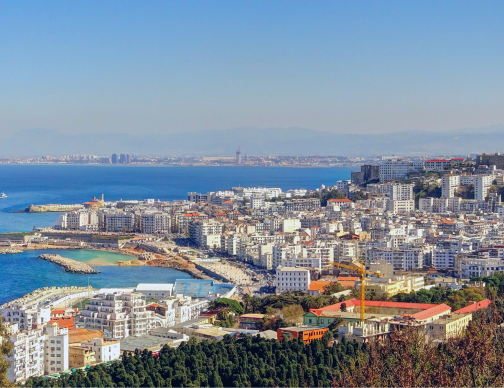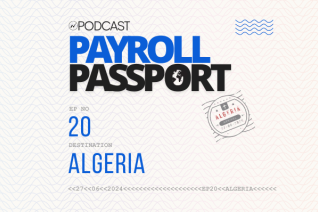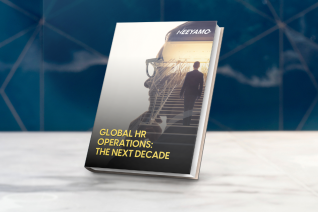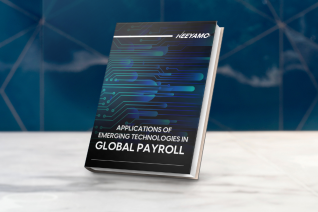Establish your presence globally with Neeyamo as we help you go beyond borders to manage your international payroll services and hire new talent in Algeria.
Overview
Algeria, the largest country in Africa, is characterized by diverse landscapes — from the vast Sahara Desert, which covers more than 80% of its territory, to fertile coastal plains and mountain ranges in the north. While much of its land area lies within the desert, millions of Algerians live in oases and desert towns, contributing to the country’s rich cultural and economic diversity.
Do your organization’s expansion plans require you to hire employees in Algeria? Do you lack a physical entity in the country – a key requisite to hire local talent? Your hunt for the best online payroll services is now over; Neeyamo – Global Payroll services, provides assistance for the onboarding and management of employees in Algeria along with processing a firm's payroll accounting, compliance, benefits, and more.
Tools And Instances
Facts And Stats
Capital
Algiers
Currency
Algerian Dinar (DZD)
Official Language
Arabic
Fiscal Year
1 January to 31 December
Date Format
DD/MM/YYYY
Country Calling Code
+ 213
Time Zone
Central European Time Zone (UTC+01:00)
Global Payroll
Overview
Handling payroll or global payroll management for a widespread workforce can pose a significant challenge for any organization, and the added complication of compliance can make things worse. If companies spend more time processing payroll, it directly impacts day-to-day operations and their overall productivity. The solution to this is outsourced payroll services.
Over the years, Global payroll companies such as Neeyamo – global payroll providers, have observed these complexities and strived to provide a global payroll solution through a single technology platform - Neeyamo Payroll.
Payroll Taxes
Payroll tax is the percentage amount retained from an employee's salary and paid to the government to invest in the general population's welfare. These are statutory in nature and are levied from both the employer and employee. Additional statutory contributions are made by employers towards providing both short-term and long-term benefits for their employees.
Payroll Associations
The Global Payroll Association (GPA) is instrumental in supporting individuals and global payroll companies engaged in payroll and its related functions. These associations offer many advantages that foster professional growth, facilitate networking prospects, encourage knowledge exchange, and promote industry advocacy.
Employee Taxes
Social Insurance Contribution: 9% of gross salary (covers retirement, illness/disability, unemployment, and work accidents).
| Annual Taxable Income (DZD) | Tax Rate |
|---|---|
| Up to 240,000 DZD | 0% |
| 240,001 DZD to 480,000 DZD | 23% |
| 480,001 DZD to 960,000 DZD | 27% |
| 960,001 DZD to 1,920,000 DZD | 30% |
| 1,920,001 DZD to 3,840,000 DZD | 33% |
| Above 3, 840,000 DZD | 35% |
Employer Taxes
Social-Insurance Contribution: Approximately 26 % of each employee’s gross salary
|
Category |
Employer Rate |
|---|---|
|
Retirement |
11% |
|
General Social Insurance (illness, maternity, disability) |
11.5% |
|
Unemployment insurance |
1% |
|
Work Accidents & Occupational Diseases |
1.25% |
|
Total (approx.) |
26% |
Payroll Cycle
Overview
Payroll is a critical process for any organization. In Algeria, the payroll cycle refers to the period for which an employer pays its employees.
Frequency
In Algeria, the standard practice is to pay employees on a monthly basis. Under the labor code, workers earning a monthly wage must be paid at least once a month and, for monthly-paid workers, no later than the 6th day of the following month.
13th & 14th Month Salary
There is no legal obligation for employers to provide a 13th and 14th month salary in Algeria. The payment of an extra month’s salary or other end-of-year bonus is entirely discretionary and depends on what is provided in the employment contract, company policy or collective bargaining agreement.
Global Work
Overview
An Employer of Record (EOR) service provider helps you eliminate the hassle of handling complexities while onboarding a new employee in an international location. They help bridge the gap that otherwise mandates organizations to have a local registered entity and a local bank account prior to making a job offer to an international hire.
Providers of EOR services act as legal employers, facilitates\ salary payments, and manage other statutory requirements such as health insurance, payroll taxes, and employee benefits, ensuring compliance with local tax laws and regulations.
This allows organizations to focus on collaborating with the employee in Algeria for operational tasks, with the knowledge that they have a cost-effective solution to support their global business payroll & HR requirements as they continue their global expansion.
HR Mandates and Practices
Minimum Wage
The national guaranteed minimum wage (SNMG) in Algeria is 20,000 DZD per month for a standard 40-hour workweek.
Overtime
The standard working time in Algeria is 40 hours per week, usually distributed over five working days.
- Overtime is allowed only in exceptional or urgent circumstances.
- Total overtime must not exceed 20% of the legal working time (approximately 8 hours per week).
- The maximum working time, including overtime, must not exceed 12 hours per day.
Data Retention Policy
- Employers are required to maintain detailed records of employee wages, payments, deductions, and benefits.
- These records must be preserved for a statutory period — commonly four years — for inspection and tax compliance purposes.
- Retention periods may vary depending on the nature of the records and applicable administrative regulations.
Hiring and Onboarding Requirements
Hiring
The Algerian Constitution guarantees equality and prohibits discrimination in employment. It ensures the right to work, the right to form and join trade unions, and the prohibition of forced or compulsory labor.
The minimum legal age for employment in Algeria is 16 years. Younger individuals may work as apprentices with the consent of their parents or legal guardian. Although the law prohibits the employment of minors in hazardous conditions, Algeria has not yet issued a specific regulation defining the types of hazardous work prohibited for children.
Onboarding
Employers are generally required to collect and maintain employment documentation and ensure registration of employees with the national social security system.
- Signed and accepted job offer or employment contract
- Detailed curriculum vitae (CV)
- Copy of national identity card
- Copy of the “Chifa” social security health insurance card (CNAS registration)
- Complete bank account details (issued by the employee’s bank)
Note: The above list represents standard HR practice in Algeria and may vary depending on company policy or industry.
Probation
Algerian labor law allows an initial probationary period at the start of employment. The standard maximum probation period is up to six (6) months.
Leave
National Holidays
- New Year’s Day
- Amazing New Year
- Eid al-Fitr
- Eid al-Fitr Holiday
- Labour Day
- Eid al-Adha
- Eid al-Adha Holiday
- Islamic New Year
- Ashura
- Independence Day
- Prophet Muhammad’s Birthday
- Revolution Day.
Annual Leave
- Employees are entitled to 30 calendar days of paid annual leave per year of service.
- For employees working in the Southern provinces, the entitlement increases to 40 calendar days.
- Leave accrues after a minimum of one year of service with the employer.
Sick Leave
As per recent Algerian regulations, employees are entitled to partially paid sick leave, primarily funded through the National Fund of Social Security.
- First 15 days: Employees receive 50% of their regular salary.
- From the 16th day onwards: Employees receive 100% (full) of their salary.
- Hospitalization: If an employee is admitted to the hospital at any point, they are entitled to their full salary from the first day of hospitalization.
- Duration: Sick leave can last for up to three years for the same illness, with payment rates increasing over time.
- Medical Certificate: A medical certificate is generally required for absences longer than three days.
Maternity Leave
Under Algerian law, female employees are entitled to 150 days (five months) of fully paid maternity leave. This leave is funded through the National Social Security Fund (CNAS) rather than directly by the employer. In cases where the newborn suffers from a disability, congenital disorder, or serious illness, the leave period may be extended by an additional 50 days, and in exceptional medical circumstances, it may be extended by up to 165 further days based on medical certification.
Paternity Leave
Male employees are entitled to three days of paid paternity leave for the birth of a child. This leave is fully paid by the employer.
Family Event Leave (Special Paid Leave)
- Marriage of the employee.
- Marriage of a child or descendant.
- Death of a parent, child, spouse, or first-degree relative (including those of the spouse).
- Circumcision of a child of the worker.
- In cases of birth or death, the justification can be submitted afterward.
Union or Staff Representation Leave
Employees may be granted paid leave to perform duties related to trade union or staff representation, for durations defined by law or collective agreements.
Training or Examination Leave
Paid leave may be granted for participation in professional or trade-union training courses authorized by the employer, or to sit for academic or professional examinations. The duration is not fixed in the law; it is subject to employer authorization and defined by contract or internal policy.
Pilgrimage Leave
The worker may take paid leave once during their career to perform the pilgrimage to the holy places (Hajj). The duration is not fixed in the law; it is subject to employer authorization and defined by contract or internal policy.
Special Unpaid Leave
Under Article 56 of the Algerian Labor Code, an employer may grant special unpaid leave to an employee who urgently needs to be absent from work. This leave is not a statutory entitlement but is allowed at the employer’s discretion, with its conditions and duration determined by the organization’s internal regulations.
Termination
Notice period
The law does not prescribe a fixed statutory notice period. Instead the minimum notice is determined by the applicable collective agreement or company regulations.
Severance pay
- Applies to employees on an indefinite-duration contract (CDI) who are dismissed (individually or collectively) for reasons other than serious misconduct.
- The statutory formula is: 1 month’s salary per full year of service, up to a maximum of 15 months’ salary.
- The “salary” base used for calculation is the most favorable average monthly remuneration received during the last three years of employment.
- If the dismissal is for serious misconduct, no indemnity is due under the law.
Visa
Overview
Foreign nationals cannot legally work in Algeria without prior authorization. Both the employer and the employee have defined responsibilities in obtaining and maintaining valid work and residence documents.
1. Work Authorization Types
There are two main types of work authorization in Algeria:
- Used for short-term employment or technical assignments.
- Valid for 15 days, with extensions possible up to 90 days per calendar year.
- Typically used for urgent technical work, maintenance, or installation services.
- Issued locally by the Employment Directorate (Direction de l’Emploi) of the relevant wilaya (province).
- Required for employment exceeding 3 months.
- Generally valid for 1 to 2 years and renewable.
- Must be approved before the foreign employee enters Algeria for work.
- Also issued by the wilaya’s Employment Directorate.
2. Work Visa
Once the relevant work authorization is approved (Annex 13 or Work Permit), the foreign employee must apply for a Work Visa at the Algerian consulate in their home country.
- Temporary Work Visa: issued on the basis of an Annex 13 Declaration, allowing short-term employment (up to 90 days).
- Work Visa: issued on the basis of a Work Permit, allowing long-term employment (more than 3 months).
- The visa is generally valid for entry within 90 days and grants the right to stay for the period stated in the permit.
3. Residence Permit
After arrival in Algeria, any foreign employee staying for more than 90 days must apply for a Residence Permit (Carte de Résident).
- Usually valid for 2 years, renewable.
- Can only be issued if the foreigner holds a valid Work Permit or Temporary Work Authorization.
- The application is made at the local police or wilaya office.
Employee Background Checks
Legal and Background Checks
Background checks in Algeria for employment typically involve verifying a candidate's identity, education, and employment history, and obtaining a criminal record certificate. Employers must obtain the candidate's written consent before conducting any screening, and the process is subject to local data protection and anti-discrimination laws.
Last updated on November 05, 2025
If you have any queries or suggestions, reach out to us at irene.jones@neeyamo.com
Have Queries? Get In Touch With Us
Get in touch with one of our experts and take a quick demo of our services










